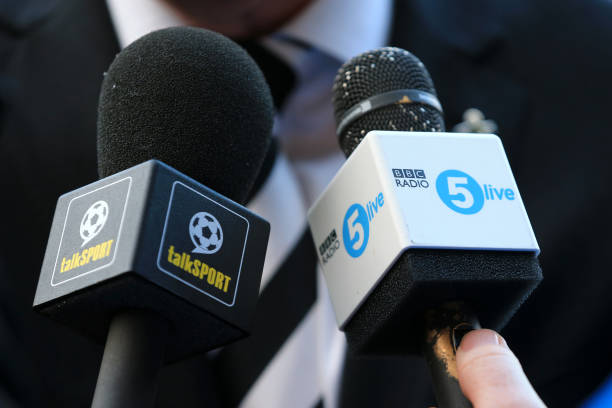
The BBC says it rejects the headline findings of a report by academics at the University of Kent into the levels of news and current affairs output on Radio 5 live.
The university’s Centre for Journalism was given a £25,000 research grant by News UK, the parent company of talkSPORT and talkRADIO operator Wireless, to produce the report, which finds that 5 live is not meeting Ofcom’s requirement that 75% of output should be news and current affairs.
The report claims the station’s 2018 output was 44.95% news and 55.05% ‘non-news’. The proportion of news and current affairs output was 48.28% on weekdays and 36.625% at weekends, it says.
Head of the Centre for Journalism, Professor Tim Luckhurst, a former Assistant Editor at 5 Live and a senior member of the team that designed and launched the station, said: “The role of news has never been more important to democratic societies. It is crucial that the public has excellent access to factual, accurate journalism. BBC Radio 5 Live was created to provide such journalism. Our research demonstrates that it is no longer fulfilling all of its commitments as a news provider. We think our findings are important both for the BBC and for its new regulator, Ofcom.”
The researchers also say 5 live has “ceased to be a news and sport station”, instead suggesting it is a “sport and talk station with a fierce commitment to sport and a lesser, legacy commitment to news”. The report also asserts that the news coverage “reveals an appetite for entertainment, celebrity and music stories in preference to public affairs.”
News UK says the research was carried out according to the University of Kent’s Standard Terms and Conditions for Research Grants, and without the company’s involvement. The university says that, in common with most research grants – public or private – it was for a specific purpose: in this case to ‘assess the delivery of BBC Radio 5 Live’s public service commitments’.
The BBC has told RadioToday that it was not consulted by the authors of the report at any stage, and says its own figures show 5 live exceeds its obligation, with 76% of output being news and current affairs programming in the 2017-18 financial year.
The corporation also says it has asked the University of Kent if it is comfortable one of its academics has been paid to write a report by an organisation that clearly has a commercial interest in the outcome. The university says that is has “made clear from the outset that the funder could not influence the conduct of the research or its outcome”.
A BBC spokesperson said: “This is shameless paid-for lobbying. Given this report was paid for by the parent company of talkSPORT, people can judge its credibility for themselves. We reject its headline findings entirely as 5 Live consistently meets all of its regulatory targets; a fact recorded in the BBC’s Annual report each year. Even a casual listener would fail to recognise the description this report presents of the station’s output.”
Responding to the findings, Wireless CEO Scott Taunton said: “Wireless is invested in offering additional choice in the speech radio market through our talkRADIO, talkSPORT and talkSPORT2 channels. We believe commercial radio’s sustainability is hampered by the BBC’s 80% share of speech radio listening and significant funding, spectrum and cross-promotional advantages. Distinctiveness is important in ensuring the public service delivery of BBC output and providing room for independent services to develop.”
Jimmy Buckland, Wireless Director of Strategy, added: “There has been significant change for the BBC in recent years, with regulatory oversight moving to Ofcom following the abolition of the BBC Trust. We are concerned that BBC Radio 5 Live’s obligations to demonstrate distinctiveness and to deliver 75% news output have not been safeguarded, resulting in a reduction in public value on behalf of licence fee payers.”
Researchers listened to 115 hours of 5 live’s output between February and October 2018 – you can read the full report here.
RadioToday’s take
If you read the full report, you’ll quickly understand why there appears to be a discrepancy between the researchers’ numbers and those from the BBC. It all comes down to what constitutes ‘news and current affairs’ – and it seems the academics’ view differs significantly from the BBC’s definition.
While the Centre for Journalism says it has used academic research to form its methodology, putting topics into boxes can, in our view, often be very subjective. At what point does a sports story stop being ‘sport’ and become ‘news’ – England being knocked out of the football World Cup in the semi-finals? A country being accused of wide-spread drug cheating in sport? A footballer’s light aircraft going missing? And where’s the line between ‘entertainment chat’ and ‘current affairs’ – A film breaking all box-office records? A discussion about a TV show that’s being watched by 8 million people? 50 prominent artists calling for Israel to be stopped from hosting the Eurovision Song Contest? It’s easy to argue such topics either way. If you use a news story as the basis for a 30-minute discussion or phone-in but it ventures deeper into the subject and away from the original issue, is that still news content or is that just ‘talk radio’?
Perhaps some clarity is needed on the definitions and the way that output is monitored. One of the report’s authors, Professor Tim Luckhurst, has told Press Gazette that Ofcom have already been in touch to say they’re interested in talking to the university researchers about their methodology. Professor Luckhurst also tells RadioToday: “Our definition of news is academically rigorous and rooted in published research. It is not remotely subjective – as our methodology makes clear. We explain precisely what we mean by news and current affairs (see the extensive methodology section). The BBC has not defined what news means – although we consider what it has said on the topic in great detail. We have published our re[port and our methodology and it is available for all to read. The BBC has not published any explanation of its own assessment that it produces 76% news and current affairs. We have repeatedly asked it to do so.”
The fact that the research has been paid for by the owners of 5 live’s commercial rivals also clearly has some influence here – even if the researchers have never had any contact with News UK. The Centre for Journalism decided to look into whether 5 live was meeting its licence requirements, and News UK handed over £25,000. We wonder whether another commercial radio group, that doesn’t have a history of complaining about 5 live’s output, might have been so willing to pay for the research to be done?
From RadioToday in May 2010: UTV says 5 Live is failing
From RadioToday in April 2011: UTV complaint to BBC rejected
Posted on Wednesday, January 30th, 2019 at 12:38 pm by Roy Martin


